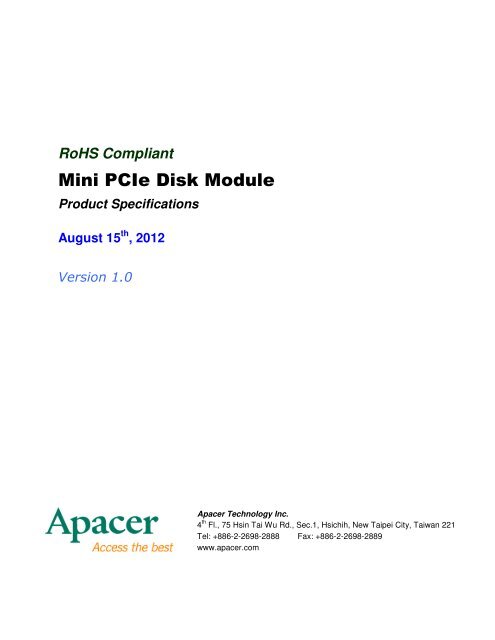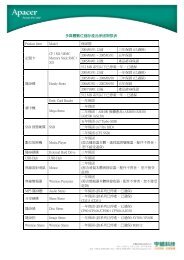2012 - Apacer
2012 - Apacer
2012 - Apacer
You also want an ePaper? Increase the reach of your titles
YUMPU automatically turns print PDFs into web optimized ePapers that Google loves.
RoHS Compliant<br />
Mini PCIe Disk Module<br />
Product Specifications<br />
August 15 th , <strong>2012</strong><br />
Version 1.0<br />
<strong>Apacer</strong> Technology Inc.<br />
4 th Fl., 75 Hsin Tai Wu Rd., Sec.1, Hsichih, New Taipei City, Taiwan 221<br />
Tel: +886-2-2698-2888 Fax: +886-2-2698-2889<br />
www.apacer.com
Features:<br />
Standard PCI Express bus interface<br />
– PCI Express 2.0*<br />
– 5.0 Gbps maximum transfer rate<br />
Operating systems support<br />
– Windows 7<br />
– Windows Vista<br />
– Windows XP<br />
– Linux**<br />
Capacity<br />
– 12, 25, 50, 100 GB<br />
Performance***<br />
– Sustain Read Speed up to 350 MB/s<br />
– Sustain Write Speed up to 175 MB/s<br />
– Random Read: 6100 IOPS<br />
– Random Write: 1600 IOPS<br />
Flash management design<br />
– On-chip wear leveling algorithms<br />
– Built-in ECC engine<br />
NAND Flash: SLC<br />
PCI-Express SSD<br />
AP-PxxxxXXX-XXX<br />
Integrated Power Management<br />
Temperature ranges<br />
– 0 to 70°C for operating temperature<br />
– -40°C to 85°C for storage temperature<br />
Supply voltage<br />
– 3.3 V +/- 5%<br />
Power consumption***<br />
– Active mode: 440 mA<br />
– Idle mode: 240 mA<br />
Form Factor<br />
– Mini PCI Express<br />
RoHS compliant<br />
Supports synchronous flash interface<br />
Supports AHCI programming interface<br />
and NVMHCI (Non-volatile Memory Host<br />
Controller Interface)<br />
Connector type<br />
– PCI Express bus x1 lane<br />
*The mPDM is not completely backward compatible. Operational instability or inefficiency may occur if this device is applied on a<br />
PCIe 1.0 socket.<br />
**Since Linux is an open system that comes in various user-developed versions, conflicts may occur regarding compatibility<br />
between the device driver and the OS version.<br />
***The performance and power consumption values addressed here are typical and may vary from platforms.<br />
1<br />
© <strong>2012</strong> <strong>Apacer</strong> Technology Inc. Rev. 1.0
PCI-Express SSD<br />
AP-PxxxxXXX-XXX<br />
Table of Contents<br />
1. GENERAL DESCRIPTION.................................................................................................... 3<br />
1.1 HOST INTERFACE FEATURES.................................................................................................................................3<br />
1.1.1 AHCI Programming Interface ......................................................................................................................3<br />
1.1.2 NVMHCI.......................................................................................................................................................3<br />
1.2 WEAR LEVELING .................................................................................................................................................3<br />
1.3 ECC.....................................................................................................................................................................4<br />
2. PIN ASSIGNMENTS ............................................................................................................... 5<br />
3. PRODUCT SPECIFICATION................................................................................................ 6<br />
3.1 CAPACITY.............................................................................................................................................................6<br />
3.2 PERFORMANCE .....................................................................................................................................................6<br />
3.3 ENVIRONMENTAL .................................................................................................................................................7<br />
4. ELECTRICAL SPECIFICATION ........................................................................................ 8<br />
5. PHYSICAL CHARACTERISTICS....................................................................................... 9<br />
6. PRODUCT ORDERING INFORMATION........................................................................ 10<br />
6.1 PRODUCT CODE DESIGNATIONS .........................................................................................................................10<br />
6.2 VALID COMBINATIONS .......................................................................................................................................11<br />
APPENDIX - DRIVER SUPPORT LIST................................................................................. 12<br />
2<br />
© <strong>2012</strong> <strong>Apacer</strong> Technology Inc. Rev. 1.0
1. General Description<br />
PCI-Express SSD<br />
AP-PxxxxXXX-XXX<br />
<strong>Apacer</strong>’s mPDM (mini PCIe Disk Module) SSD offers a breakthrough in non-volatile memory storage.<br />
Formed as a mini PCI-Express card, this mPDM can fit in various types of embedded platforms, such as<br />
workstation, thin computing devices and high-end heavy duty servers where spaces are concerned.<br />
Though in mini form factor, <strong>Apacer</strong> mPDM delivers ideal data read/write performance that easily<br />
surpasses its SATA counterparts. The controller unit of our mPDM is designed to support synchronous<br />
interface for enhanced transfer rate.<br />
<strong>Apacer</strong> mPDM provides one-lane PCI-Express 2.0 host interface, and is compatible with 5.0 Gbps<br />
maximum transfer rate. Regarding flash management design, the central controlling unit of this PCI-<br />
Express SSD is built with on-chip ECC engine and wear-leveling mechanism for endurance. For optimal<br />
operation, mPDM supports AHCI (Advanced Host Controller Interface) and NVMHCI (Non-volatile<br />
Memory Host Controller Interface), which makes it an ideal storage device for heavy duty and high end<br />
embedded applications.<br />
With the low-latency nature and advanced interface compatibility, the mPDM can be the ideal industrial<br />
drive as it cuts boot time. Regarding operating conditions, PCI-Express SSD is built to work at 3.3 Volts,<br />
with +/- 5% deviance, and under the ideal ambient temperature at the range between 0 ~ 70°C.<br />
1.1 Host Interface Features<br />
The controller unit of this mPDM is designed to support synchronous flash interface for ideal performance.<br />
Regarding host system interface, it supports AHCI and NVMHCI for optimal operations.<br />
1.1.1 AHCI Programming Interface<br />
The controller unit of our mPDM supports AHCI (Advanced Host Controller Interface) standard<br />
programming interface. Introduced and defined by Intel, AHCI outlines a system memory structure that<br />
serves as the framework for hardware designers to establish the data flow between host system’s<br />
memory and attached storage devices.<br />
1.1.2 NVMHCI<br />
Our mPDM supports NVMHCI (Non-volatile Memory Host Controller Interface) which defines the uniform<br />
interface for host controller and software programming. NVMHCI is established to optimize interface<br />
communications between attached NAND-based memory devices and host system cache. Through<br />
standardization, NVMHCI removes the compatibility boundaries so that an operating system only has to<br />
work with one particular device driver for proper operations, saving the time for testing multiple possible<br />
candidates.<br />
1.2 Wear Leveling<br />
The mPDM is designed with on-chip wear leveling for endurance support. It is generally understood that<br />
NAND flash devices are limited by a certain number of write cycles. When using a file system, frequent<br />
file table updates is mandatory. If some area on the flash wears out faster than others, it would<br />
significantly reduce the lifetime of the whole device, even if the erase counts of others are far from the<br />
write cycle limit. Thus, if the write cycles can be distributed evenly across the media, the lifetime of the<br />
media can be prolonged significantly. The scheme is achieved both via buffer management and the onchip<br />
wear leveling to ensure that the lifetime of the flash media can be increased, and the disk access<br />
performance is optimized as well.<br />
3<br />
© <strong>2012</strong> <strong>Apacer</strong> Technology Inc. Rev. 1.0
1.3 ECC<br />
PCI-Express SSD<br />
AP-PxxxxXXX-XXX<br />
ECC (Error Correction Codes) plays a critical role in terms of data integrity and block management. Errors<br />
may be generated from NAND flash blocks from time to time and thus, a detection and correction<br />
mechanism is necessary. The mPDM is built with enhanced onboard ECC engine capable of correcting<br />
up to 8 bit per 512 which is 32 bit per 2K.<br />
4<br />
© <strong>2012</strong> <strong>Apacer</strong> Technology Inc. Rev. 1.0
2. Pin Assignments<br />
Pin 1<br />
PCI-Express SSD<br />
AP-PxxxxXXX-XXX<br />
Pin 51<br />
Pin Signal Pin Signal<br />
51 Reserved 52 +3.3V<br />
49 Reserved 50 GND<br />
47 Reserved 48 Reserved<br />
45 Reserved 46 Reserved<br />
43 GND 44 Reserved<br />
41 3.3V 42 Reserved<br />
39 3.3V 40 Reserved<br />
37 GND 38 NC<br />
35 GND 36 NC<br />
33 PETp0 34 GND<br />
31 PETn0 32 Reserved<br />
29 GND 30 Reserved<br />
27 GND 28 NC<br />
25 PERp0 26 GND<br />
23 PERn0 24 +3.3Vaux<br />
21 GND 22 PERST#<br />
19 Reserved 20 Reserved<br />
17 Reserved 18 GND<br />
15 GND 16 NC<br />
13 REFCLK+ 14 NC<br />
11 REFCLK- 12 NC<br />
9 GND 10 NC<br />
7 CLKREQ# 8 NC<br />
5 NC 6 NC<br />
3 NC 4 GND<br />
1 Reserved 2 3.3V<br />
5<br />
© <strong>2012</strong> <strong>Apacer</strong> Technology Inc. Rev. 1.0
PCI-Express SSD<br />
AP-PxxxxXXX-XXX<br />
3. Product Specification<br />
3.1 Capacity<br />
Capacity specification of the mPDM product family is listed in the following table.<br />
Capacity specifications<br />
Capacity Total bytes Cylinders Heads Sectors Max LBA<br />
12GB 13,421,772,800 16383 16 63 26,214,400<br />
25GB 26,843,545,600 16383 16 63 52,428,800<br />
50GB 53,687,091,200 16383 16 63 104,857,600<br />
100GB 107,374,182,400 16383 16 63 209,715,200<br />
*Cylinders, heads or sectors are not applicable for these capacities. Only LBA addressing applies<br />
**Notes: 1 GB = 1,000,000,000 bytes; 1 sector = 512 bytes.<br />
LBA count addressed in the table above indicates total user storage capacity and will remain the same throughout the lifespan of the<br />
device. However, the total usable capacity of the SSD is most likely to be less than the total physical capacity because a small<br />
portion of the capacity is reserved for device maintenance usages.<br />
3.2 Performance<br />
Performances and random read/write specifications of the mPDM are listed in the following tables.<br />
Performance<br />
Performance and random read/write 4K specifications<br />
Capacity<br />
12 GB 25 GB 50 GB 100 GB<br />
Sustained read (MB/s) 295 350 350 350<br />
Sustained write (MB/s) 115 175 175 175<br />
Random read 4K (IOPS) 6100 6100 6100 6300<br />
Random write 4K (IOPS) 1600 1600 1600 1600<br />
*Results may differ from various flash configurations and platforms.<br />
**The IOPS are calculated by IOMeter on Full Random Data pattern, 4KB Align I/Os and test time 15min<br />
6<br />
© <strong>2012</strong> <strong>Apacer</strong> Technology Inc. Rev. 1.0
3.3 Environmental<br />
PCI-Express SSD<br />
AP-PxxxxXXX-XXX<br />
Environmental specification of the mPDM product family follows the MIL-STD-810F standard.<br />
Temperature<br />
Environmental specifications<br />
Environment Specification<br />
Operation 0 to 70°C<br />
Storage -40°C to 85°C<br />
Vibration (Non-Operation) Sine wave: 10~2000Hz, 15G (X, Y, Z axes)<br />
Shock (Non-Operation) Half sine wave, Peak acceleration 50 G, 11 ms (X, Y, Z ; All 6 axes)<br />
7<br />
© <strong>2012</strong> <strong>Apacer</strong> Technology Inc. Rev. 1.0
PCI-Express SSD<br />
AP-PxxxxXXX-XXX<br />
4. Electrical Specification<br />
Caution: Absolute Maximum Stress Ratings – Applied conditions greater than those listed under<br />
“Absolute Maximum Stress Ratings” may cause permanent damage to the device. This is a stress rating<br />
only and functional operation of the device at these conditions or conditions greater than those defined in<br />
the operational sections of this data sheet is not implied. Exposure to absolute maximum stress rating<br />
conditions may affect device reliability.<br />
Absolute maximum stress ratings<br />
Parameter Min. Typical Max. Units<br />
Power supply 3.13 3.3 3.46 V<br />
Operating temperature 0 70 °C<br />
Storage temperature -40 85 °C<br />
State<br />
Power consumption (typical)<br />
Capacity<br />
12 GB 25 GB 50 GB 100 GB<br />
Active (mA) 360 405 420 440<br />
Idle (mA) 240 240 240 240<br />
*Results may differ from various flash configurations and platforms.<br />
8<br />
© <strong>2012</strong> <strong>Apacer</strong> Technology Inc. Rev. 1.0
PCI-Express SSD<br />
AP-PxxxxXXX-XXX<br />
5. Physical Characteristics<br />
Unit: mm<br />
Tolerance: ± 0.25<br />
9<br />
© <strong>2012</strong> <strong>Apacer</strong> Technology Inc. Rev. 1.0
PCI-Express SSD<br />
AP-PxxxxXXX-XXX<br />
6. Product Ordering Information<br />
6.1 Product Code Designations<br />
AP P xxxx X X X – X XX<br />
Model Name<br />
<strong>Apacer</strong> Product Code<br />
Controller Version<br />
Degree<br />
Capacity:<br />
012G: 12GB<br />
025G: 25GB<br />
050G: 50GB<br />
100G: 100GB<br />
Speed:<br />
N: Standard<br />
Flash Type<br />
FW Version<br />
10<br />
© <strong>2012</strong> <strong>Apacer</strong> Technology Inc. Rev. 1.0
6.2 Valid Combinations<br />
6.2.1 Standard<br />
Capacity P/N<br />
12GB APP012G18N-AC<br />
25GB APP025G18N-AC<br />
50GB APP050G18N-AC<br />
100GB APP100G18N-AC<br />
PCI-Express SSD<br />
AP-PxxxxXXX-XXX<br />
11<br />
© <strong>2012</strong> <strong>Apacer</strong> Technology Inc. Rev. 1.0
PCI-Express SSD<br />
AP-PxxxxXXX-XXX<br />
Appendix - Driver Support List<br />
Windows<br />
Windows 7<br />
Windows Vista<br />
Windows XP<br />
LINUX - SUSE<br />
SUSE Linux Enterprise Server 11 Service Pack 1, i386<br />
SUSE Linux Enterprise Server 11 Service Pack 1, x86_64<br />
SUSE Linux Enterprise Server 11, i386<br />
SUSE Linux Enterprise Server 11, x86_64<br />
SUSE Linux Enterprise Server 10 Service Pack 3, i386<br />
SUSE Linux Enterprise Server 10 Service Pack 3, x86_64<br />
SUSE Linux Enterprise Server 10 Service Pack 2, i386<br />
SUSE Linux Enterprise Server 10 Service Pack 2, x86_64<br />
SUSE Linux Enterprise Server 10 Service Pack 1, i386<br />
SUSE Linux Enterprise Server 10 Service Pack 1, x86_64<br />
SUSE Linux Enterprise Server 10 , i386<br />
SUSE Linux Enterprise Server 10, x86_64<br />
SUSE Linux Enterprise Desktop 11, i386<br />
SUSE Linux Enterprise Desktop 11, x86_64<br />
SUSE Linux Enterprise Desktop 10 Service Pack 2, i386<br />
SUSE Linux Enterprise Desktop 10 Service Pack 2,<br />
x86_64<br />
SUSE Linux openSUSE 11.1, i386<br />
SUSE Linux openSUSE 11.1, x86_64<br />
SUSE Linux openSUSE 11.0, i386<br />
SUSE Linux openSUSE 11.0, x86_64<br />
LINUX-Fedora<br />
Fedora Linux 11, i386<br />
Fedora Linux 11, x86_64<br />
Fedora Linux 10, i386<br />
Fedora Linux 10, x86_64<br />
Fedora Linux 9, i386<br />
Fedora Linux 9, x86_64<br />
Fedora Linux 8, i386<br />
Fedora Linux 8, x86_64<br />
12<br />
© <strong>2012</strong> <strong>Apacer</strong> Technology Inc. Rev. 1.0
LINUX - Redhat<br />
Redhat Enterprise Linux 5.5 Server, i386<br />
Redhat Enterprise Linux 5.5 Server, x86_64<br />
Redhat Enterprise Linux 5.4 Server, i386<br />
Redhat Enterprise Linux 5.4 Server, x86_64<br />
Redhat Enterprise Linux 5.3 Server, i386<br />
Redhat Enterprise Linux 5.3 Server, x86_64<br />
Redhat Enterprise Linux 5.2 Server, i386<br />
Redhat Enterprise Linux 5.2 Server, x86_64<br />
Redhat Enterprise Linux 5.1 Server, i386<br />
Redhat Enterprise Linux 5.1 Server, x86_64<br />
Redhat Enterprise Linux 5.0 Server, i386<br />
Redhat Enterprise Linux 5.0 Server, x86_64<br />
Redhat CentOS 5.5, i386<br />
Redhat CentOS 5.5, x86_64<br />
Redhat CentOS 5.4, i386<br />
Redhat CentOS 5.4, x86_64<br />
Redhat CentOS 5.3, i386<br />
Redhat CentOS 5.3, x86_64<br />
Redhat CentOS 5.2, i386<br />
Redhat CentOS 5.2, x86_64<br />
PCI-Express SSD<br />
AP-PxxxxXXX-XXX<br />
13<br />
© <strong>2012</strong> <strong>Apacer</strong> Technology Inc. Rev. 1.0
PCI-Express SSD<br />
AP-PxxxxXXX-XXX<br />
Revision History<br />
Revision Date Description Remark<br />
0.1 03/29/<strong>2012</strong> Preliminary<br />
0.2 04/25/<strong>2012</strong><br />
0.3 04/26/<strong>2012</strong><br />
0.4 07/06/<strong>2012</strong><br />
0.5 07/19/<strong>2012</strong><br />
Added capacity information<br />
Added performance specifications are filled<br />
Added power consumption table<br />
Updated mechanical drawing<br />
Updated pin assignment<br />
Revised mechanical drawing<br />
Added Random read/write information<br />
Added endurance specifications<br />
Revised capacities<br />
Added driver list appendix<br />
Added ECC description<br />
Revised driver list<br />
1.0 08/15/<strong>2012</strong> Official release<br />
14<br />
© <strong>2012</strong> <strong>Apacer</strong> Technology Inc. Rev. 1.0
Taiwan (Headquarters)<br />
U.S.A.<br />
Japan<br />
Europe<br />
China<br />
India<br />
PCI-Express SSD<br />
AP-PxxxxXXX-XXX<br />
Global Presence<br />
<strong>Apacer</strong> Technology Inc.<br />
4 th Fl, 75 Hsin Tai Wu Rd., Sec.1<br />
Hsichih, New Taipei City<br />
Taiwan 221<br />
R.O.C.<br />
Tel: +886-2-2698-2888<br />
Fax: +886-2-2698-2889<br />
amtsales@apacer.com<br />
<strong>Apacer</strong> Memory America, Inc.<br />
386 Fairview Way, Suite102,<br />
Milpitas, CA 95035<br />
Tel: 1-408-586-1291<br />
Fax: 1-408-935-9611<br />
sa@apacerus.com<br />
<strong>Apacer</strong> Technology Corp.<br />
5F, Matsura Bldg., Shiba, Minato-Ku<br />
Tokyo, 105-0014, Japan<br />
Tel: 81-3-5419-2668<br />
Fax: 81-3-5419-0018<br />
jpservices@apacer.com<br />
<strong>Apacer</strong> Technology B.V.<br />
Science Park Eindhoven 5051 5692 EB Son,<br />
The Netherlands<br />
Tel: 31-40-267-0000<br />
Fax: 31-40-267-0000#6199<br />
sales@apacer.nl<br />
<strong>Apacer</strong> Electronic (Shanghai) Co., Ltd<br />
1301, No.251,Xiaomuqiao Road, Shanghai,<br />
200032, China<br />
Tel: 86-21-5529-0222<br />
Fax: 86-21-5206-6939<br />
sales@apacer.com.cn<br />
<strong>Apacer</strong> Technologies Pvt. Ltd.<br />
# 535, 1st Floor, 8th cross, JP Nagar 3rd Phase,<br />
Bangalore – 560078, India<br />
Tel: 91-80-4152-9061<br />
sales_india@apacer.com<br />
15<br />
© <strong>2012</strong> <strong>Apacer</strong> Technology Inc. Rev. 1.0







